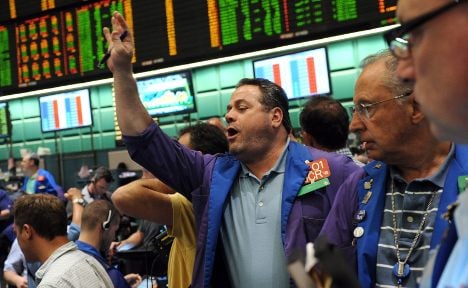The Rheinische Post newspaper said on Tuesday, the three leaders of the coalition government – Chancellor Angela Merkel of the Christian Democratic Union, Free Democratic Party leader Philipp Rösler, and Christian Social Union leader Horst Seehofer – agreed on Monday to launch a working group to look into ways to tax the financial markets.
The interdepartmental team – including officials from the chancellery, the finance ministry and the economy ministry – has been charged with coming up with a tax concept by June 13, when the government and opposition will meet to discuss the EU fiscal pact.
Some kind of tax on the financial markets is to be part of the “growth package” that the government wants to finalize before the parliamentary summer recess.
Merkel is desperate for this package to present a clear and convincing strategy for re-starting the stuttering German and EU economies. Her government is hoping that it will help convince the opposition to support the Fiscal Pact.
The German financial daily Handelsblatt said the three governmental party leaders discussed measures to appease Germany’s centre-left opposition, particularly the Social Democratic Party (SPD).
SPD parliamentary faction leader Frank-Walter Steinmeier said at the weekend that his party would only support the Fiscal Pact if the cabinet made a “clear decision” to tax financial markets.
Merkel may need opposition support, because the coalition’s majority in the lower house of the German parliament, the Bundestag, is currently wafer thin and threatened by dissent over euro issues by CDU and FDP party rebels.
Reuters news agency reported that the “growth package” would include an increase of capital for the European Investment Bank (EIB), a re-allocation of EU money specifically to combat youth unemployment, and a more binding economic policy agreement in the eurozone.
Merkel is reported to have introduced the idea of a market tax at Monday’s meeting, and the FDP, traditionally a low-tax party, said it was not opposed in principle. But FDP parliamentary leader Rainer Brüderle warned that a financial transaction tax would not be a good idea, as it would inevitably, like a value-added taxes, eventually be passed on to the consumer.
The EU Fiscal Pact, which imposes tighter budgetary discipline on member states, was agreed earlier this year by all EU members except Britain and the Czech Republic, and was passed by a referendum in Ireland last week.
The Local/bk




 Please whitelist us to continue reading.
Please whitelist us to continue reading.
Member comments